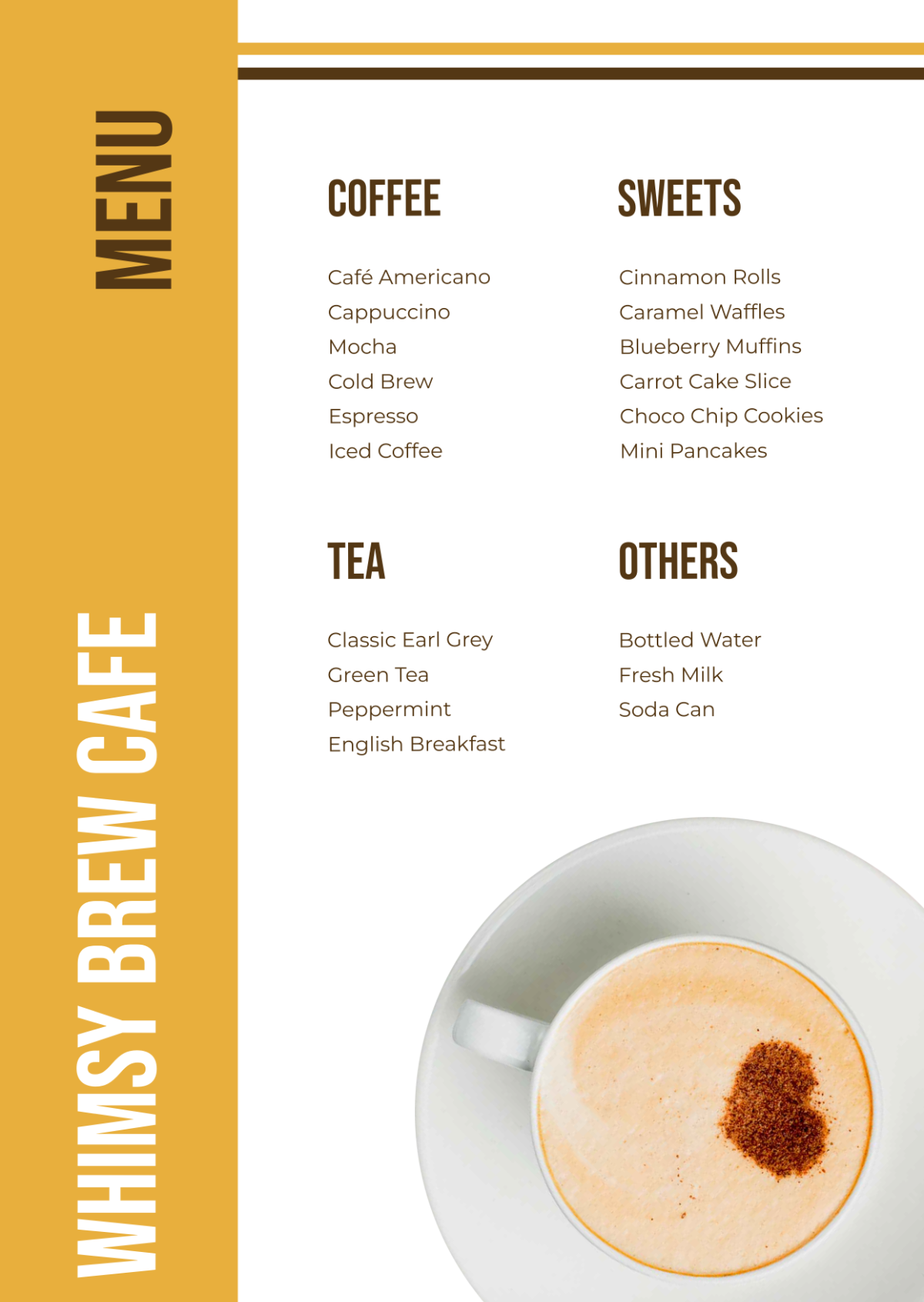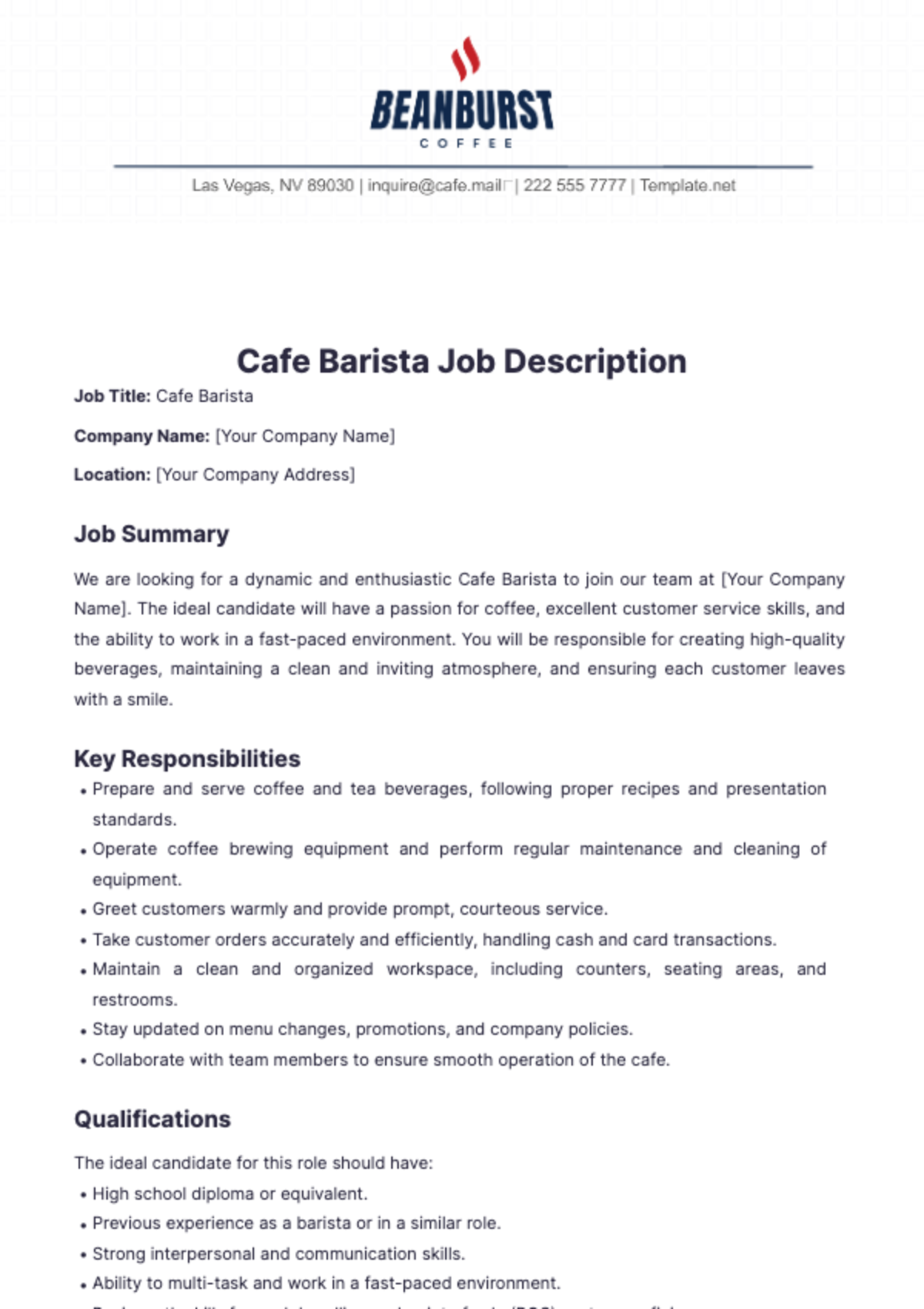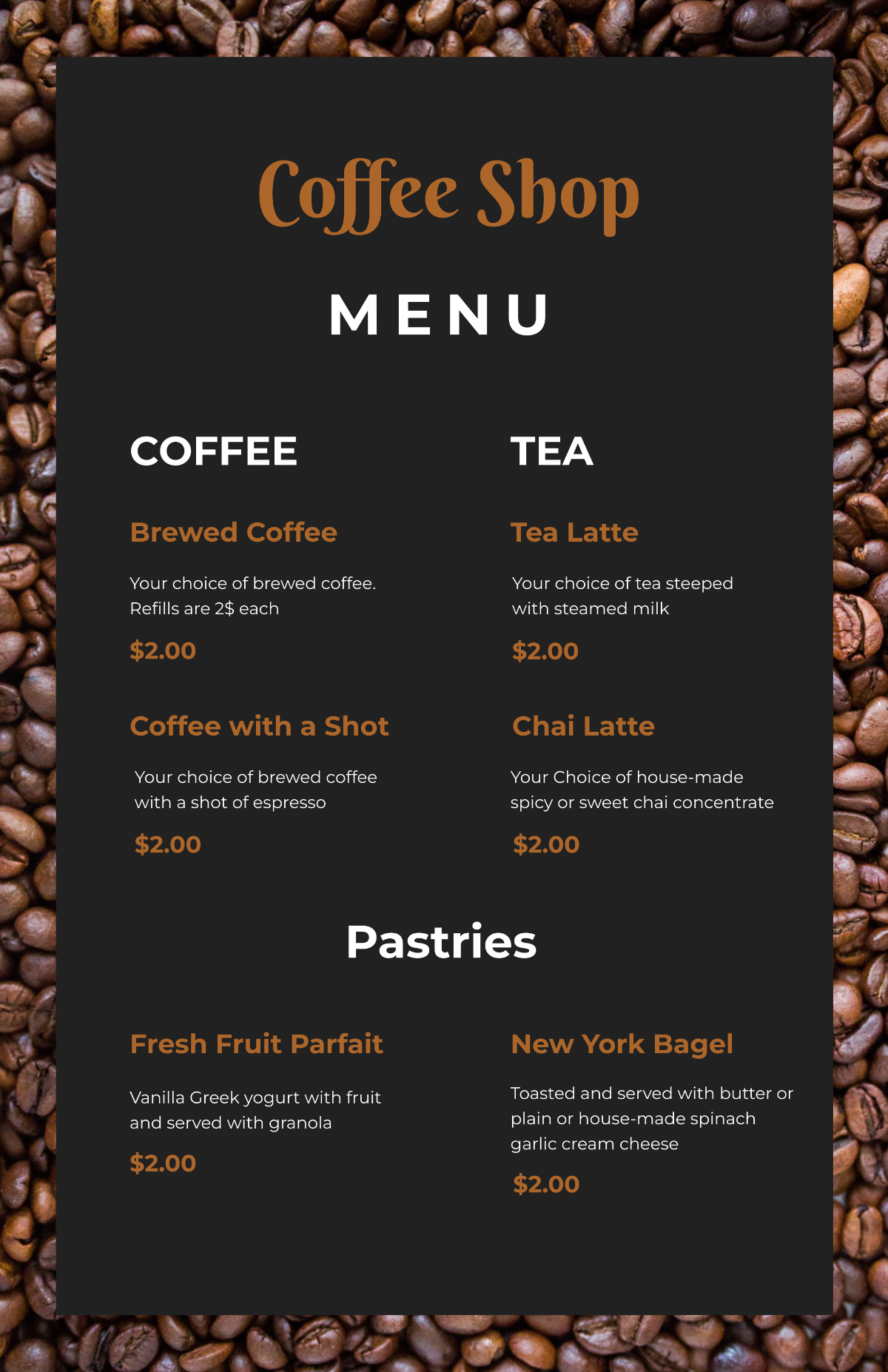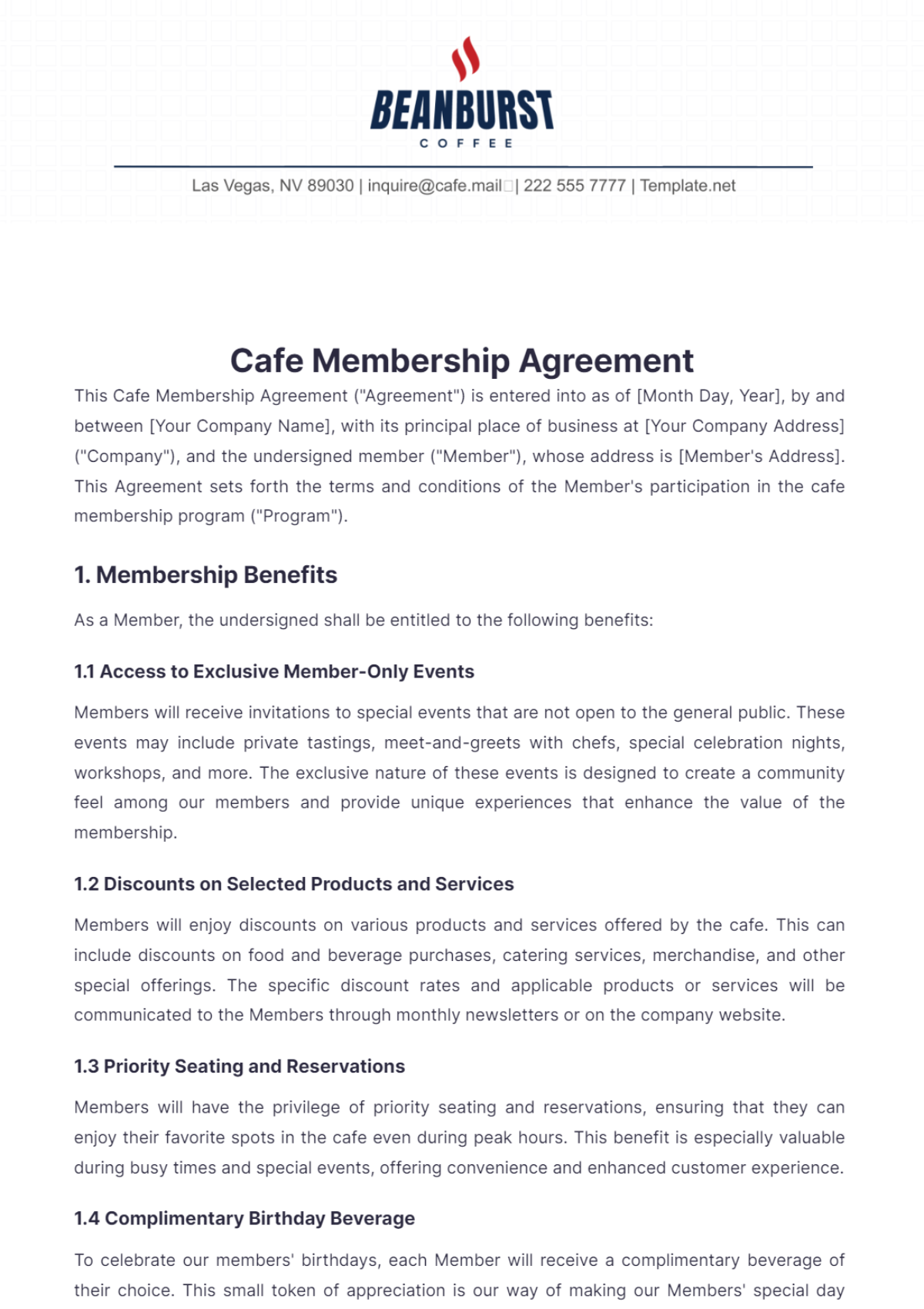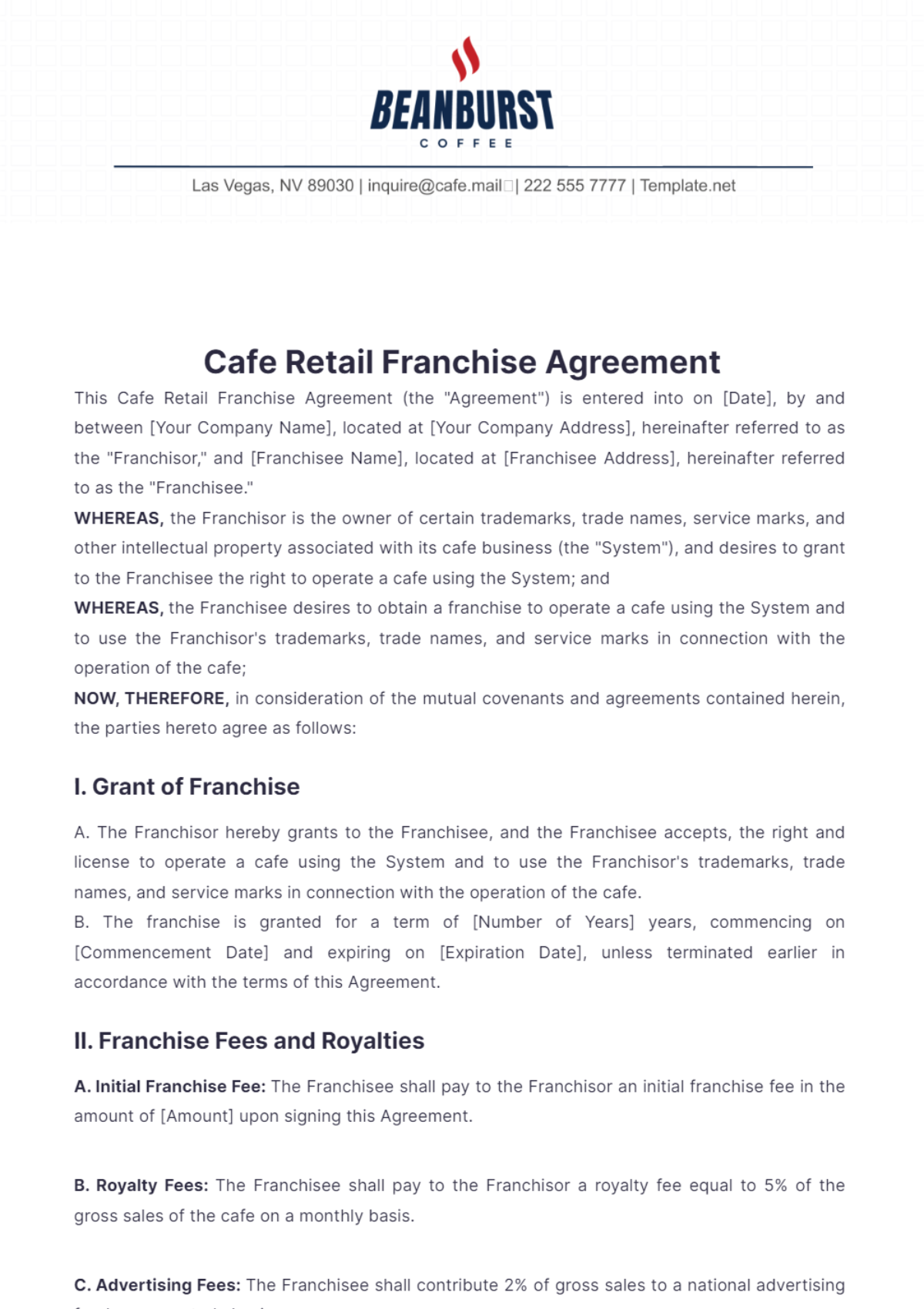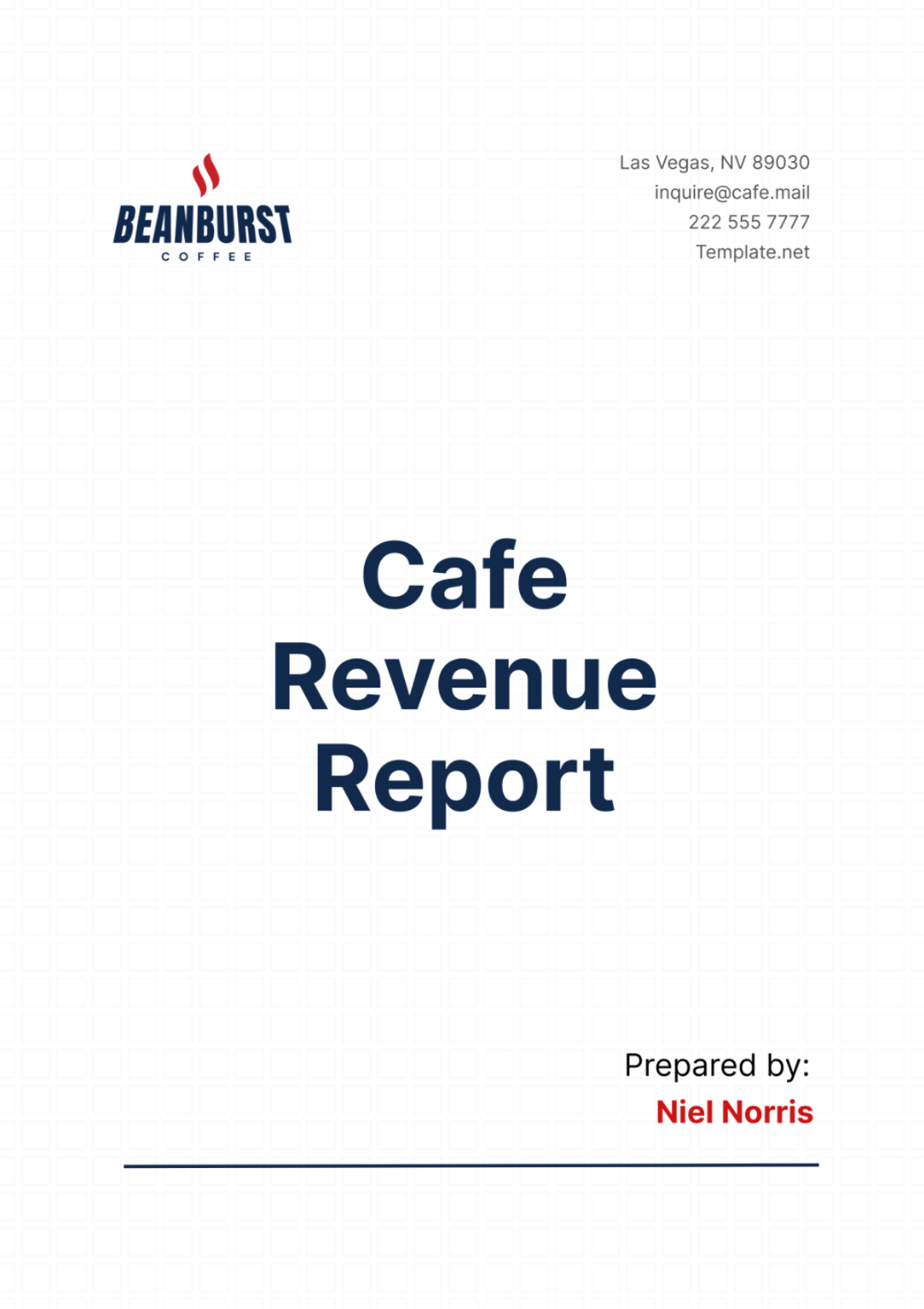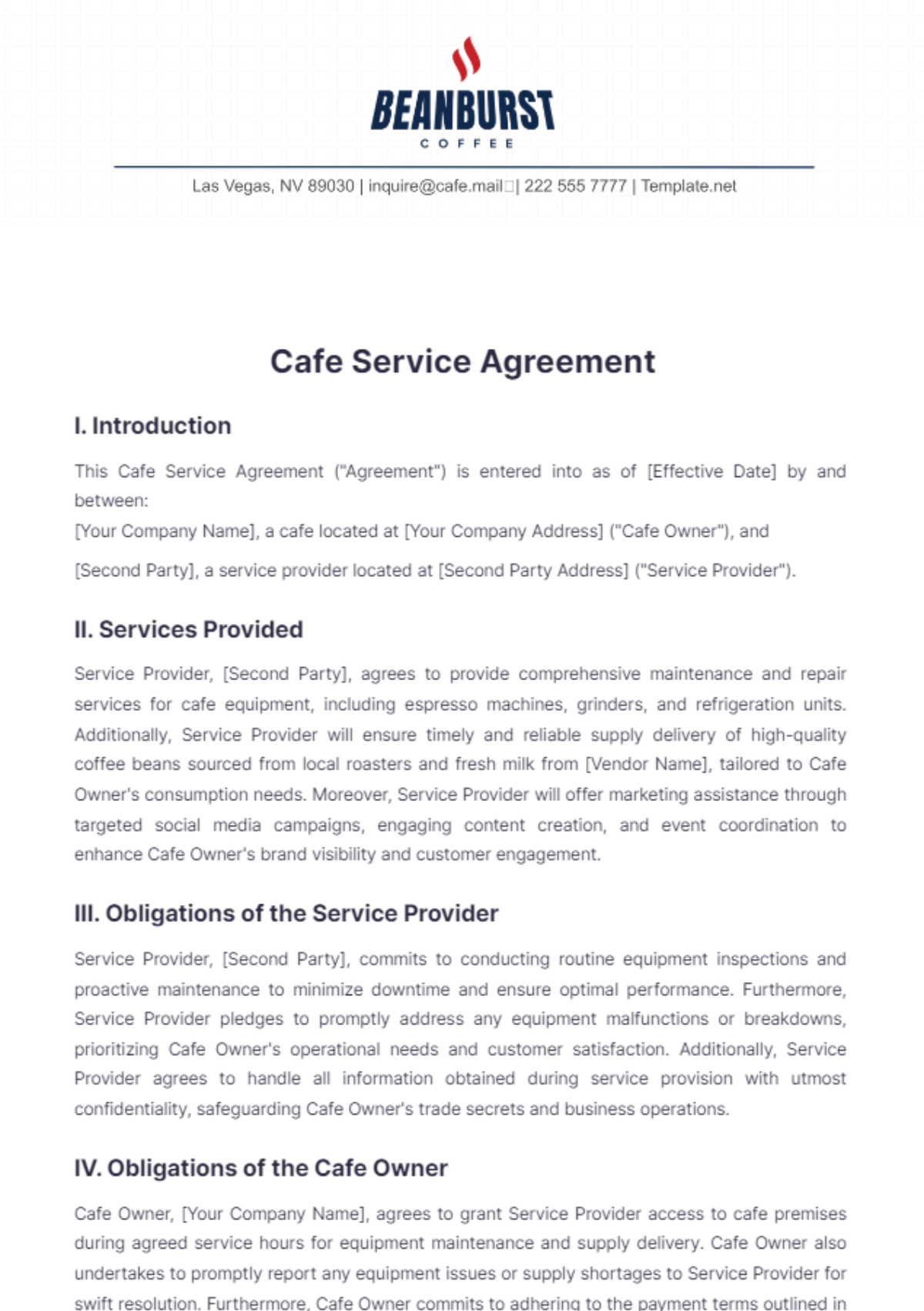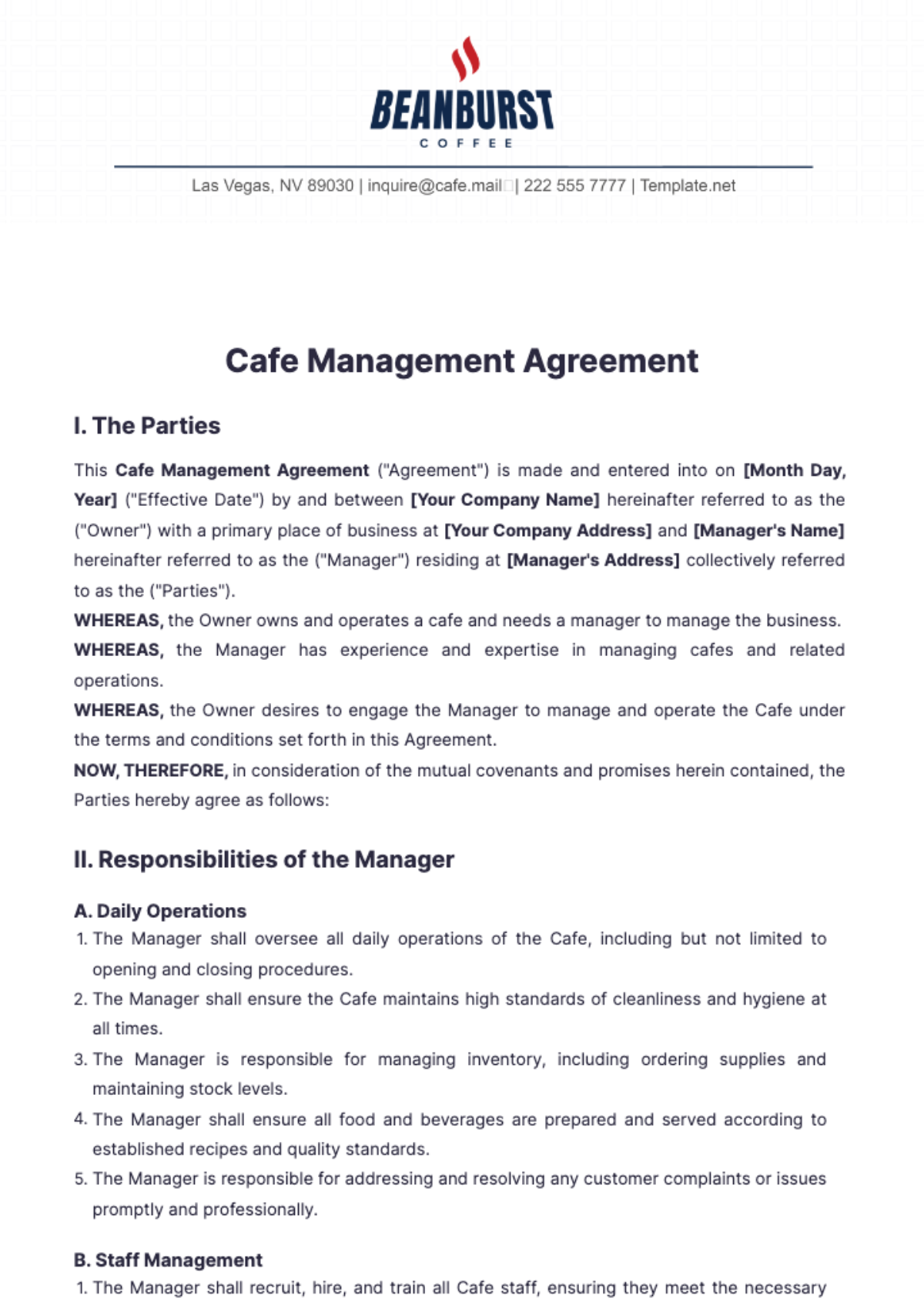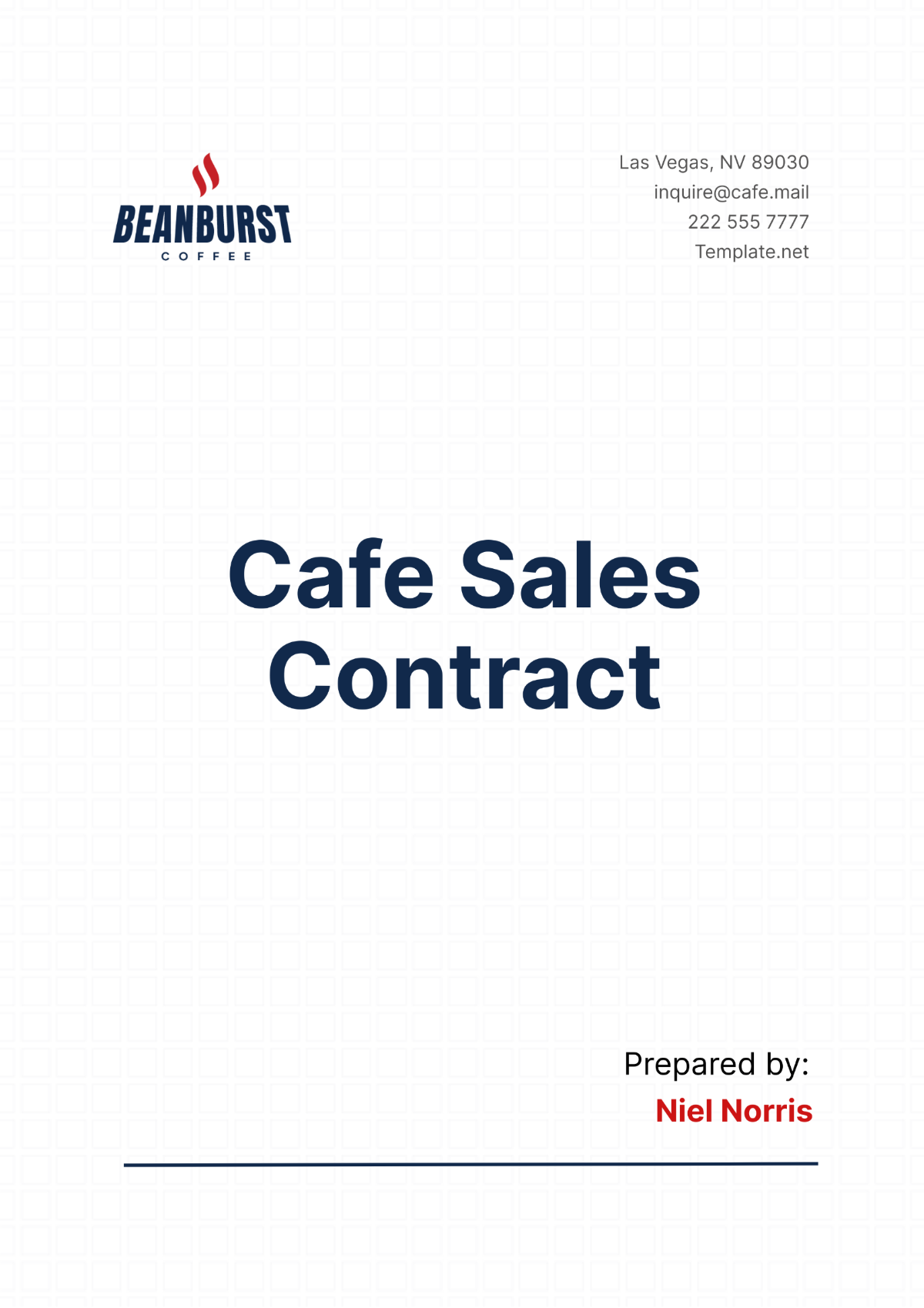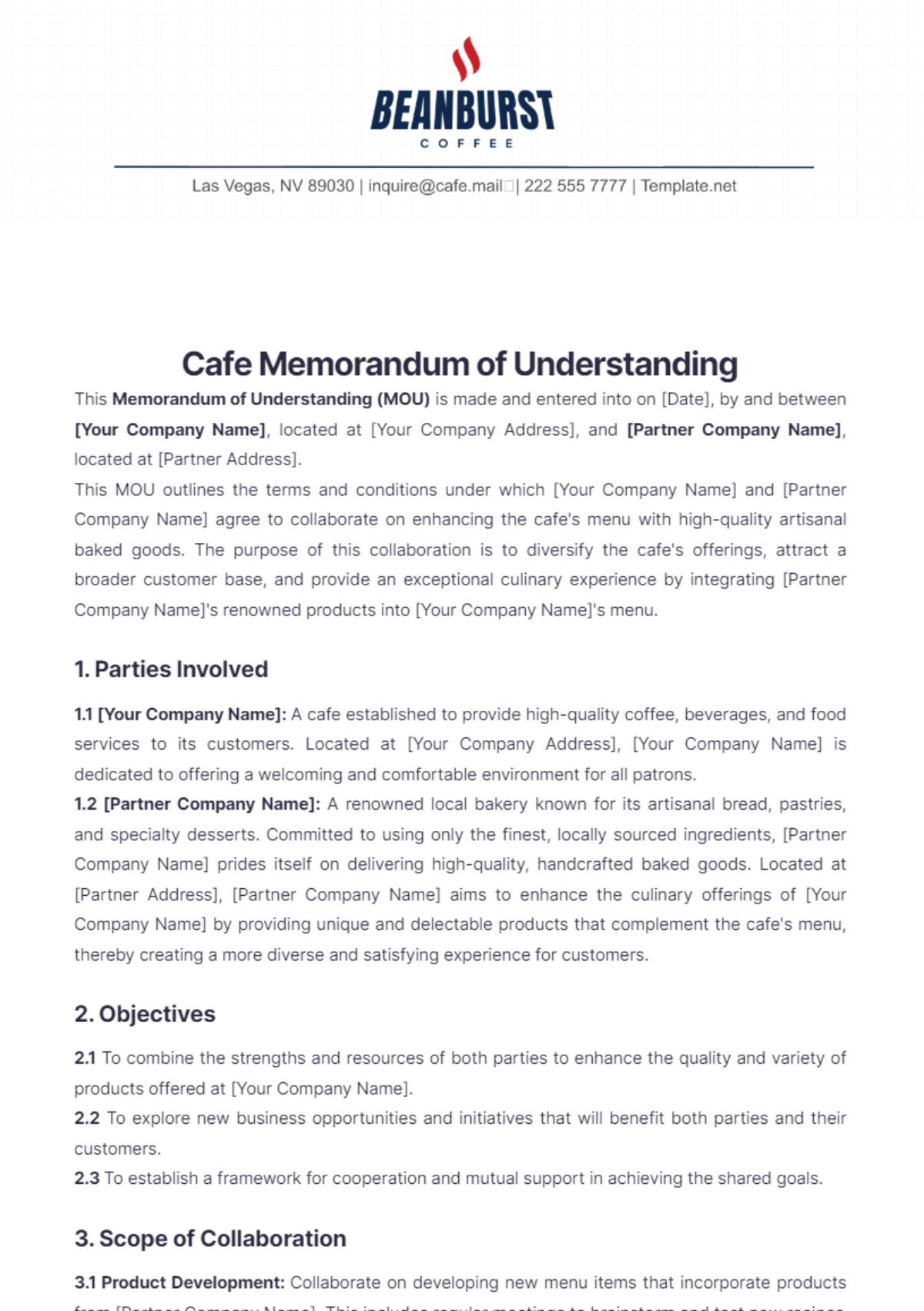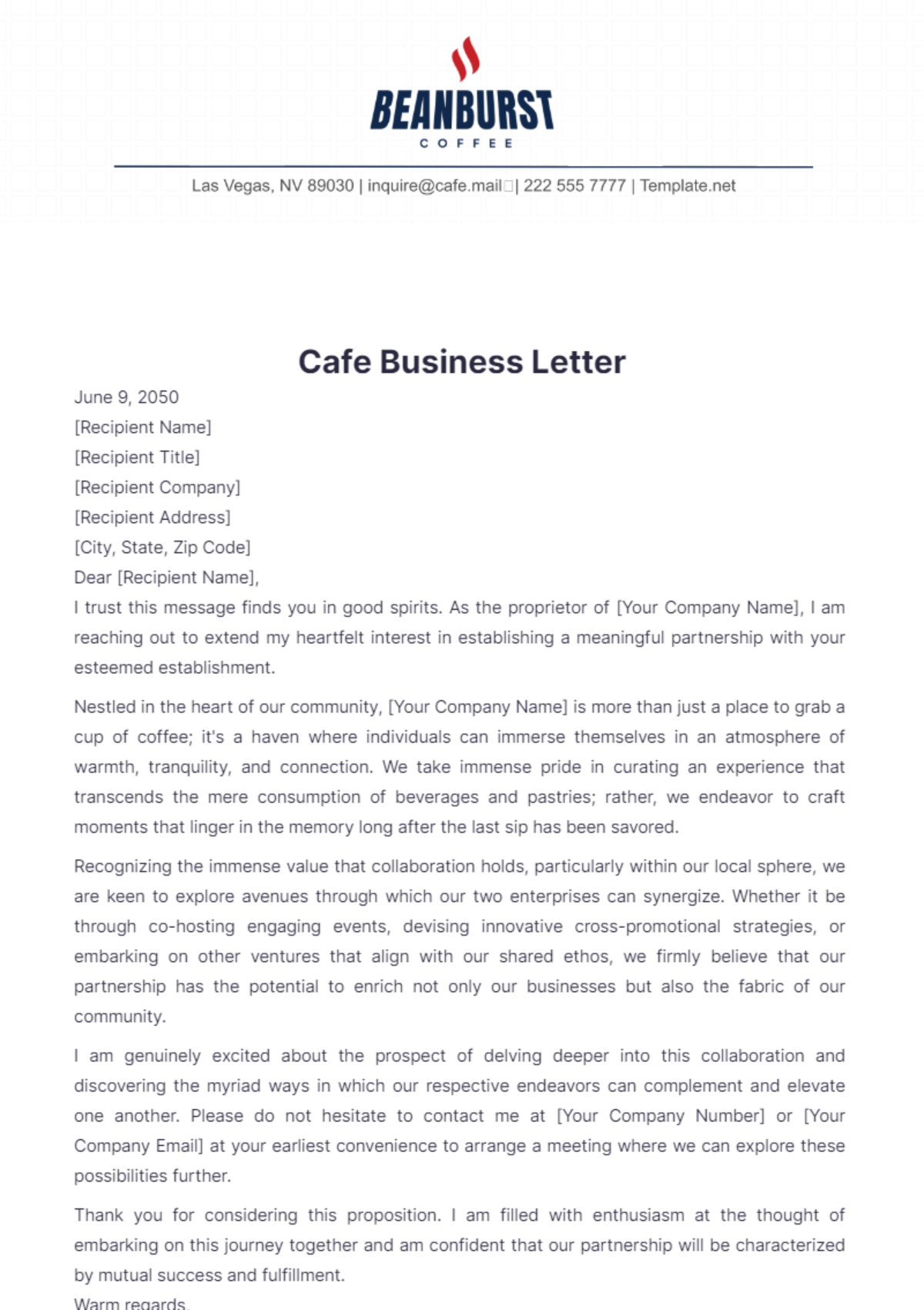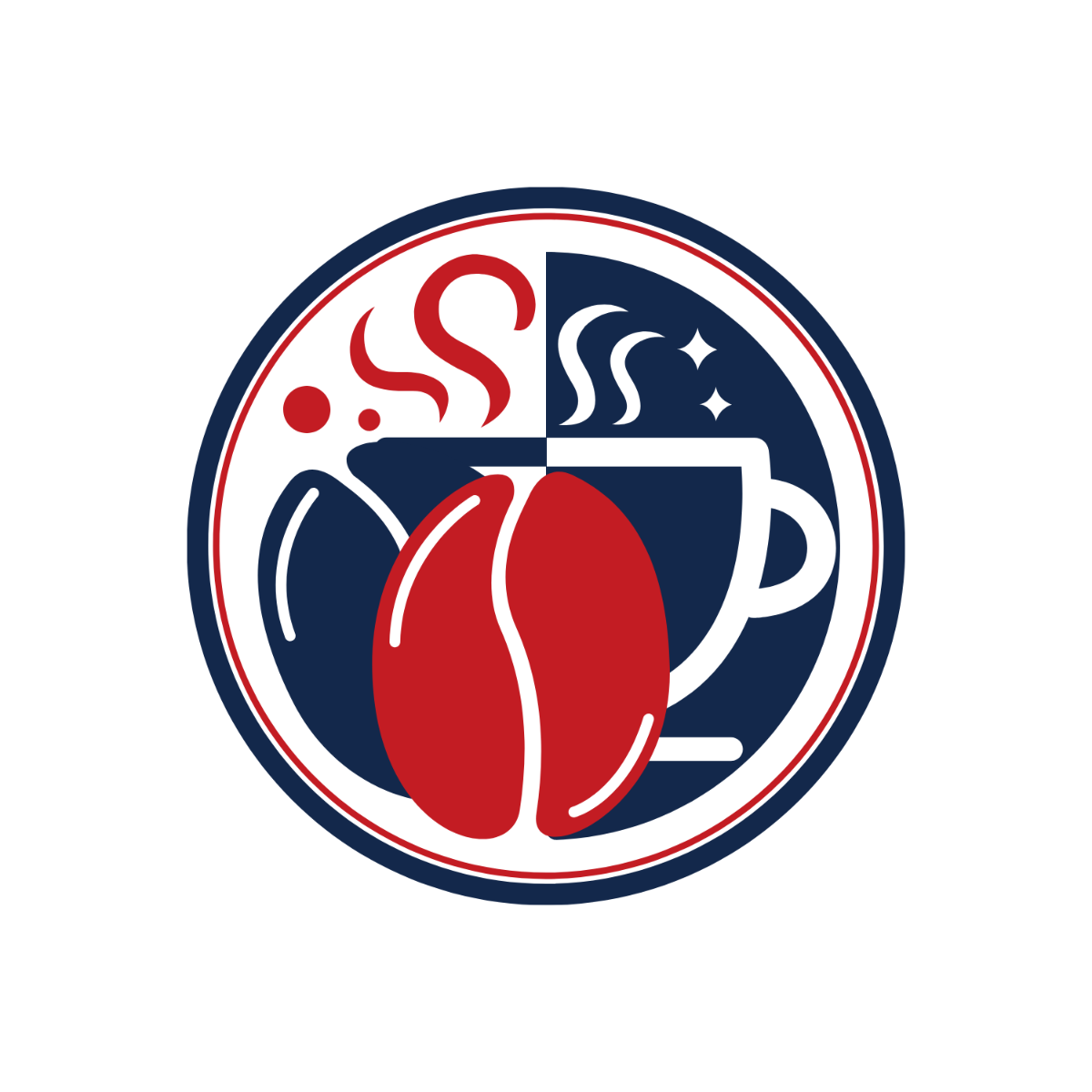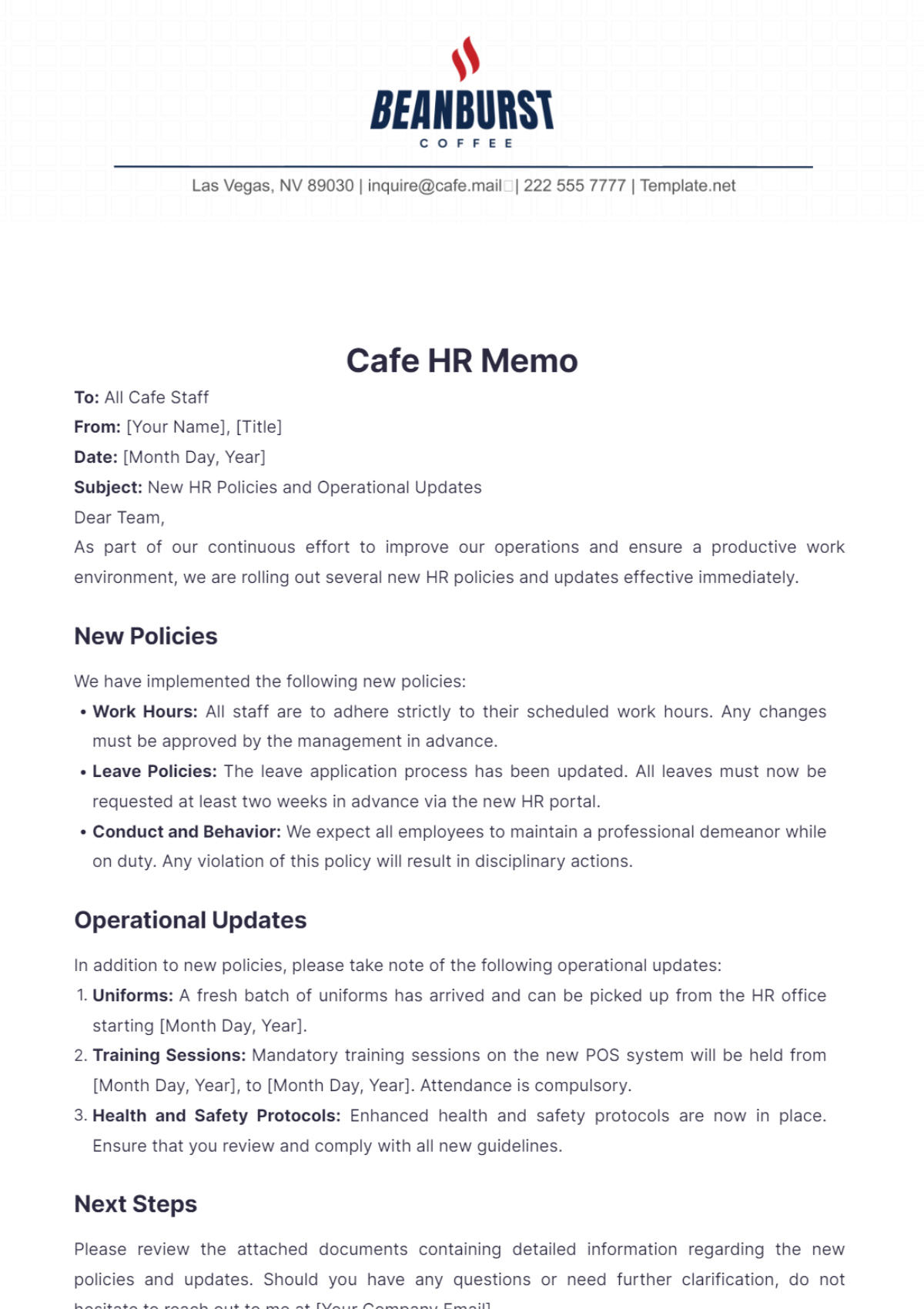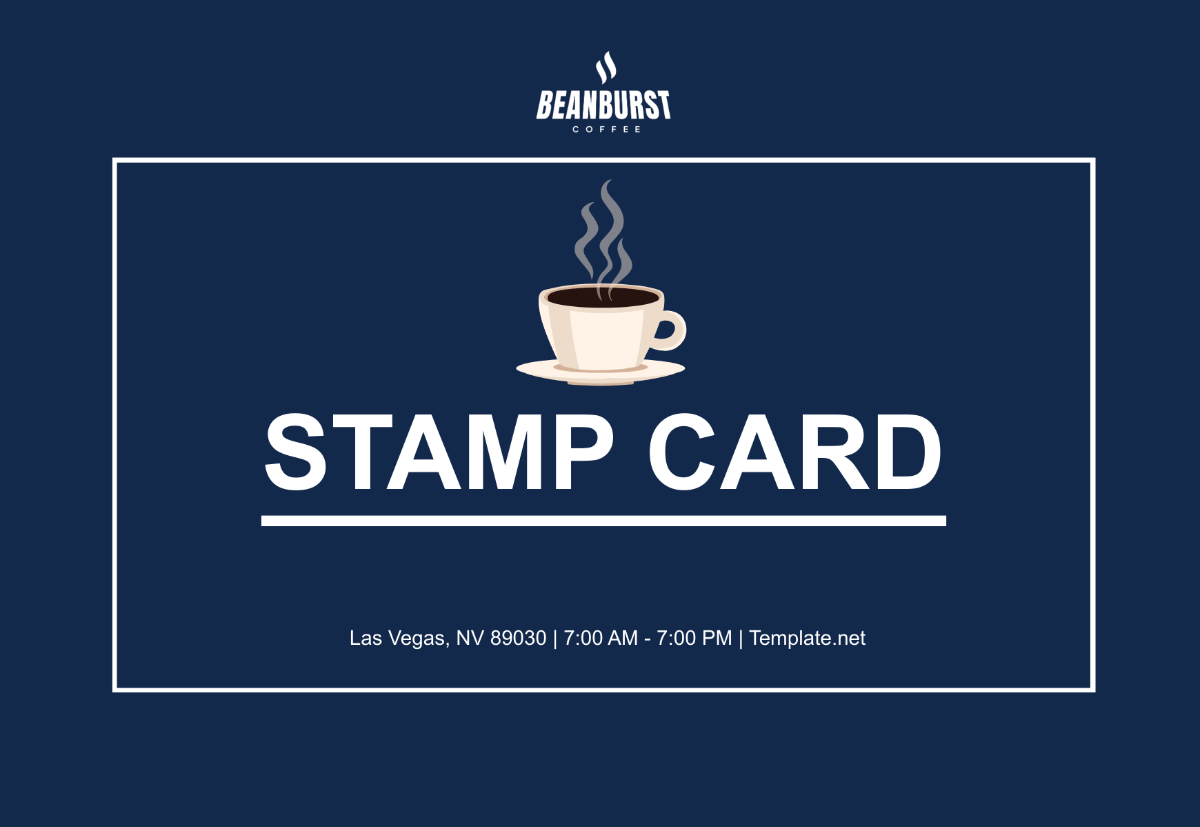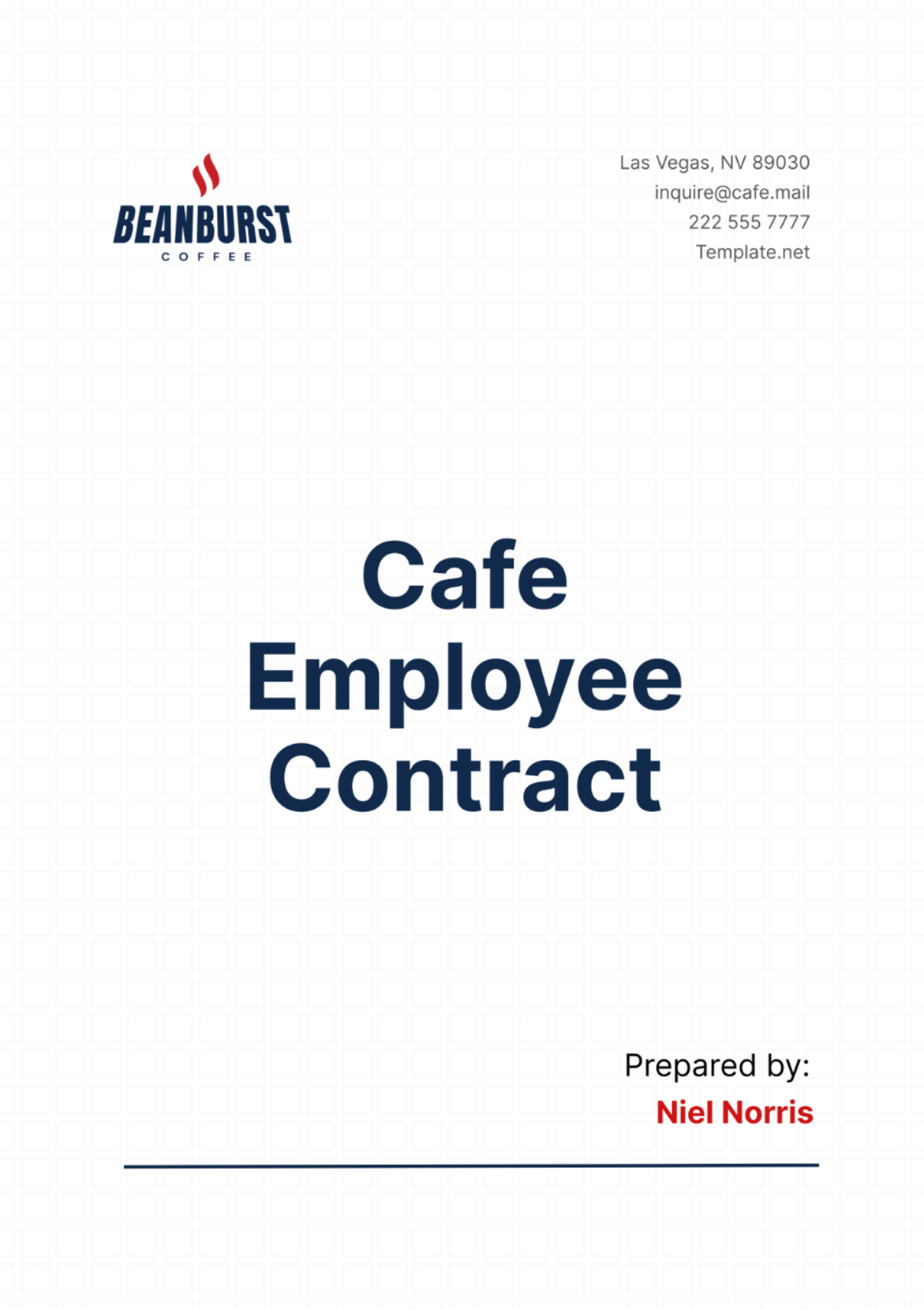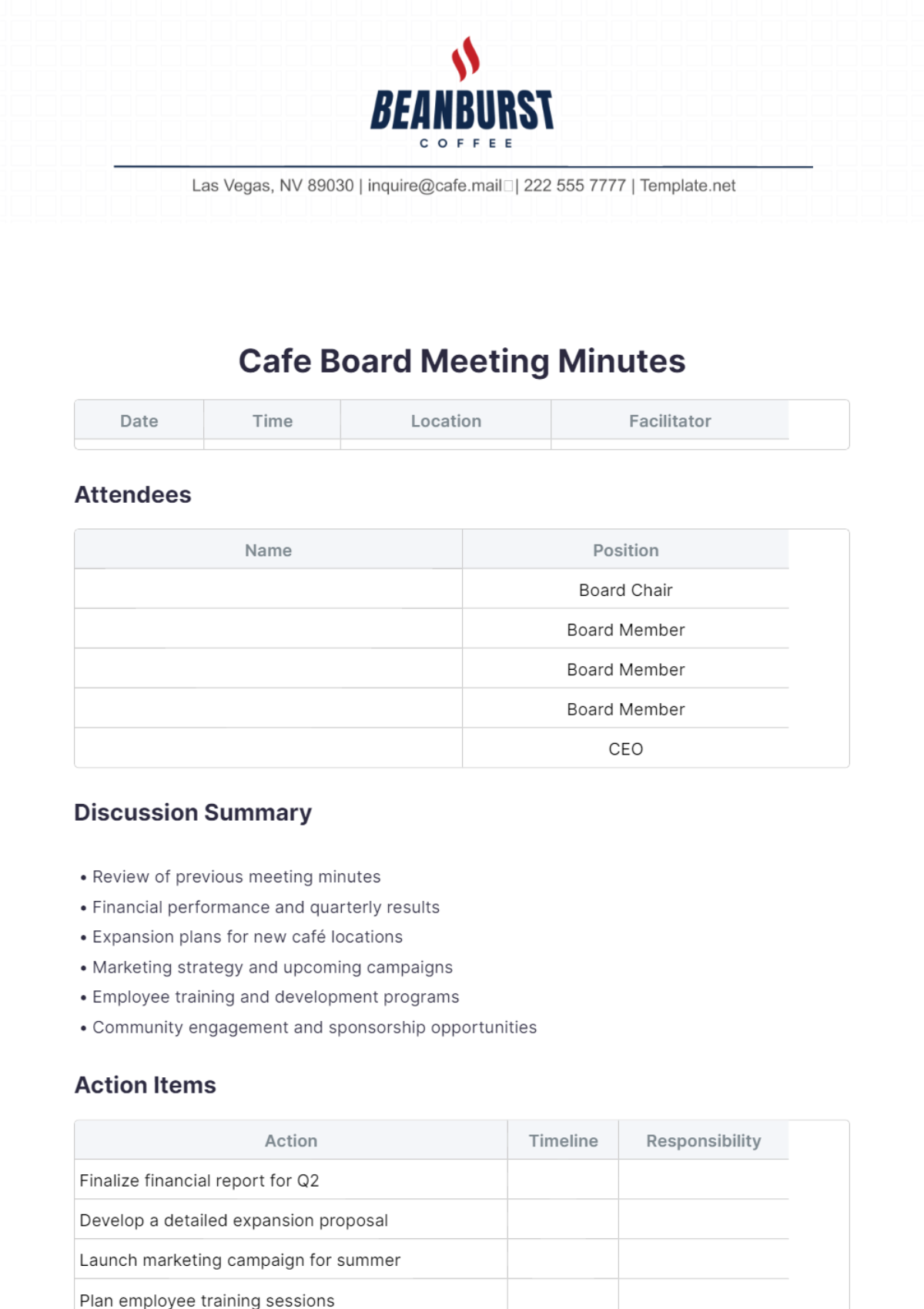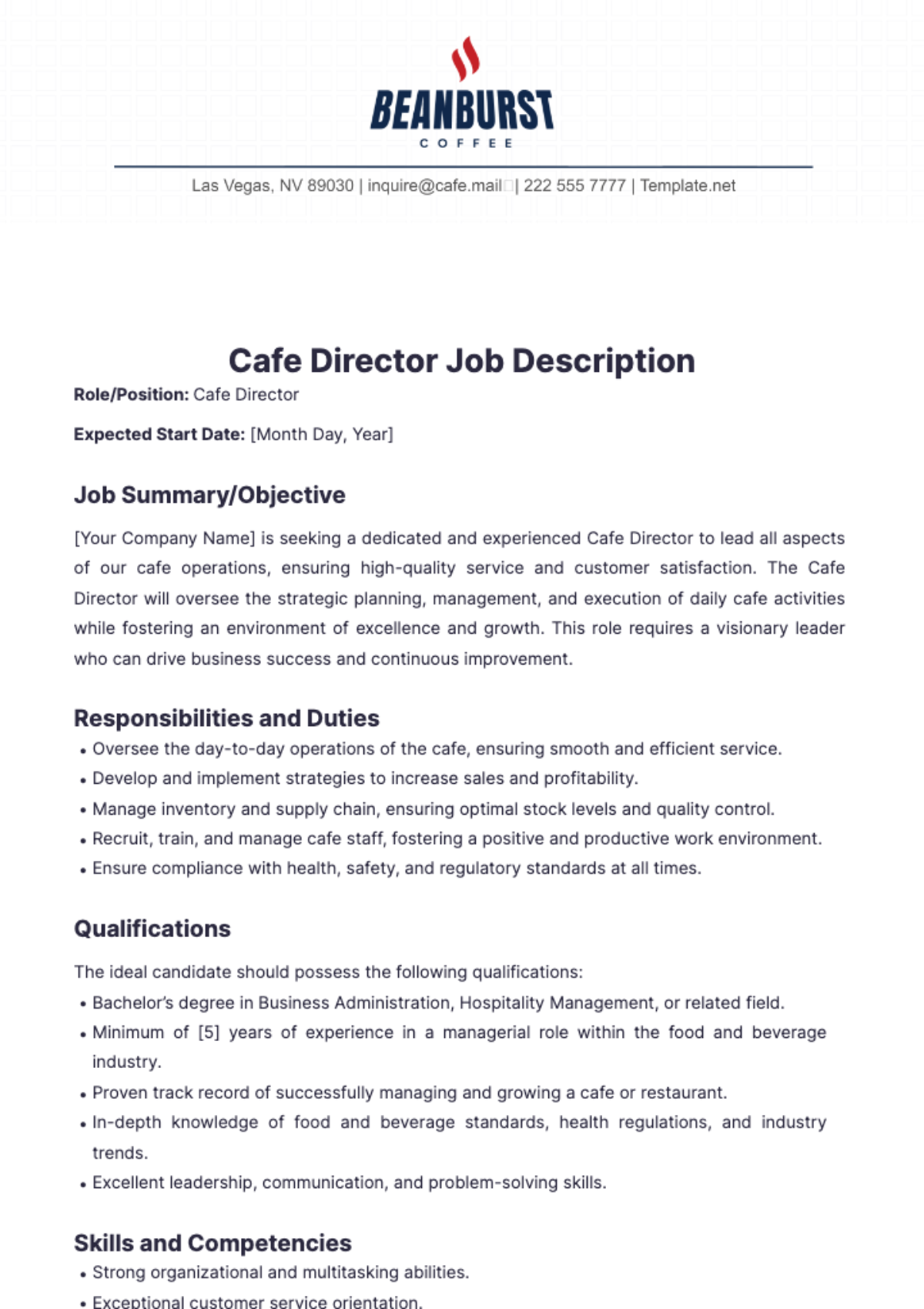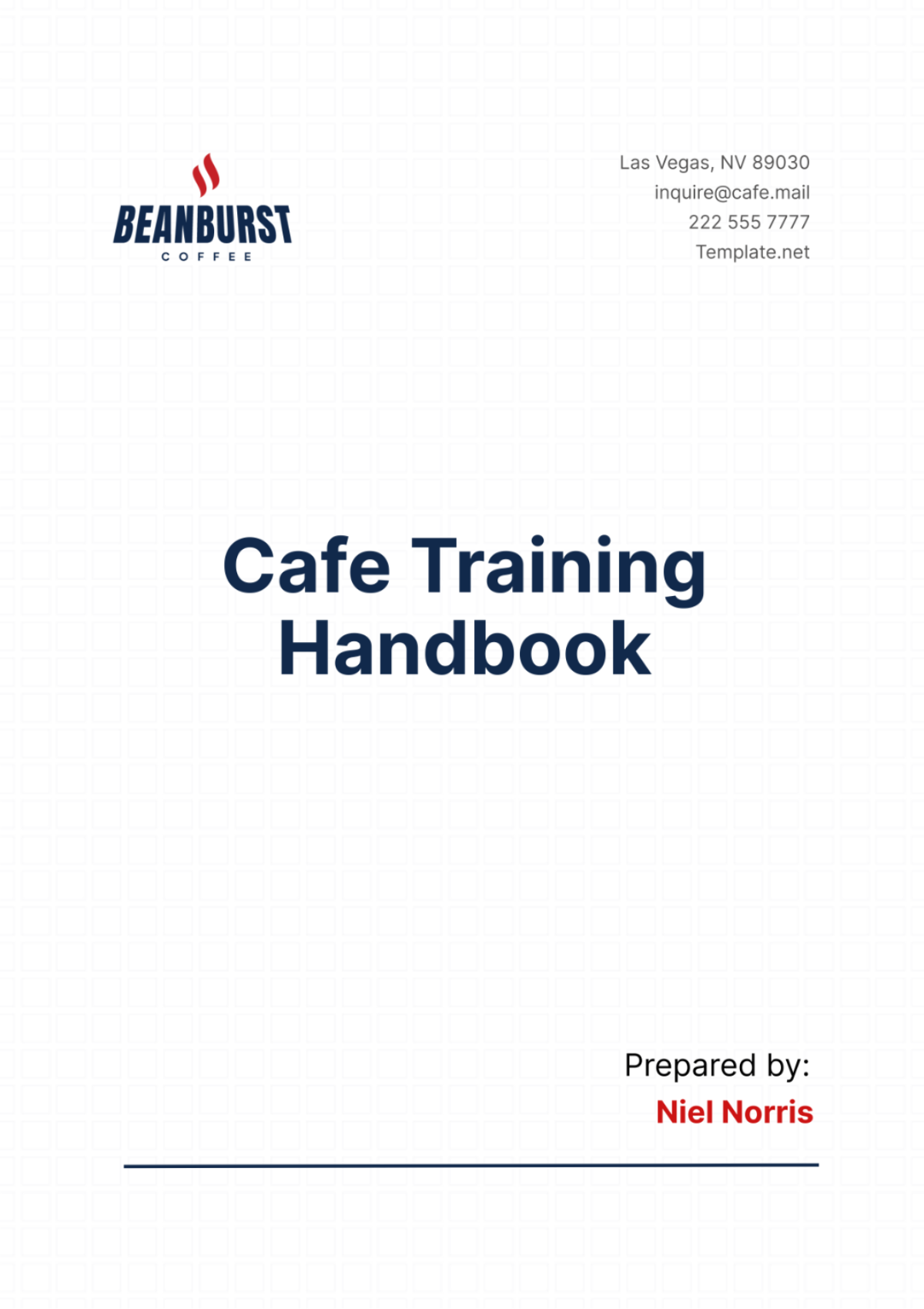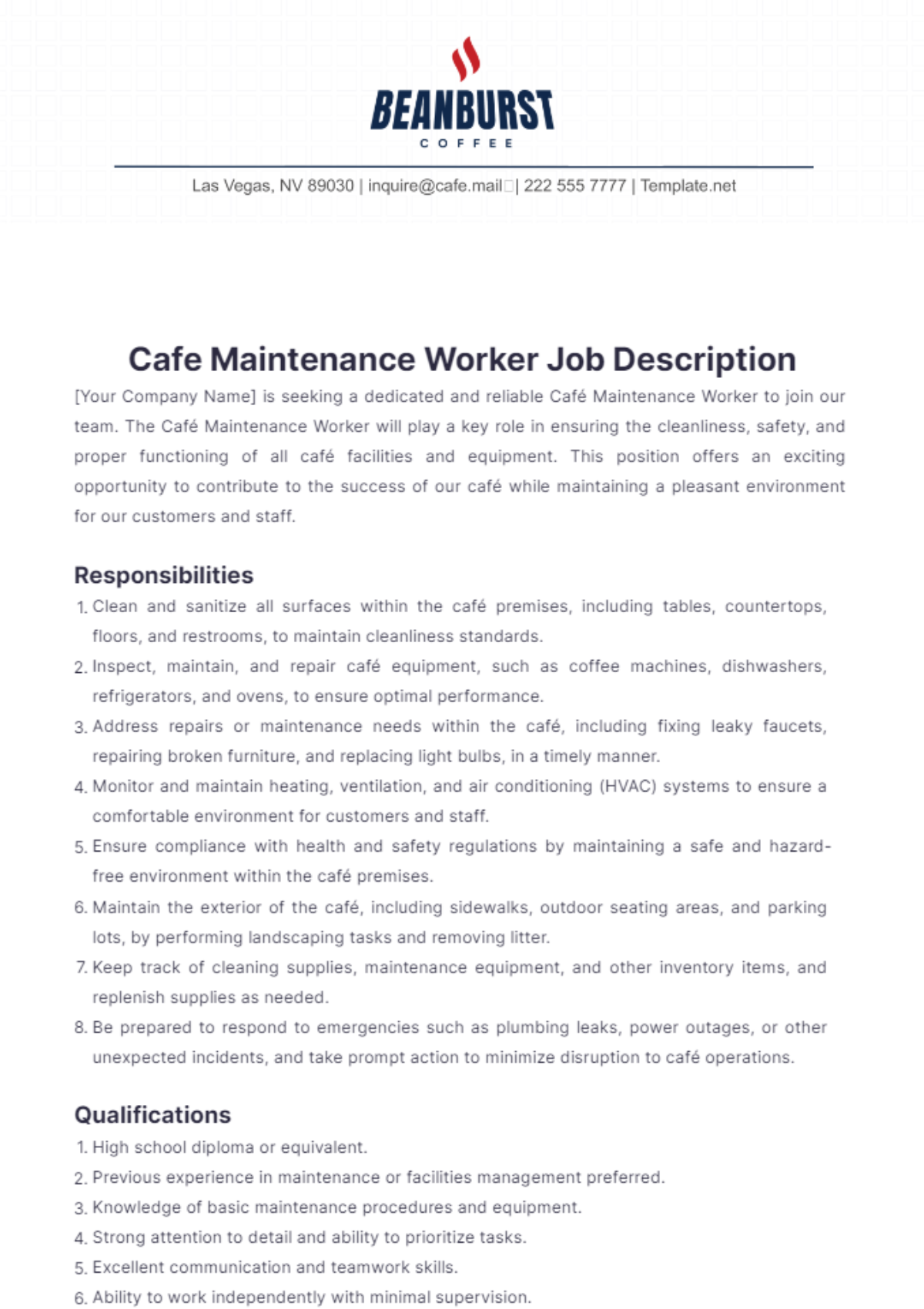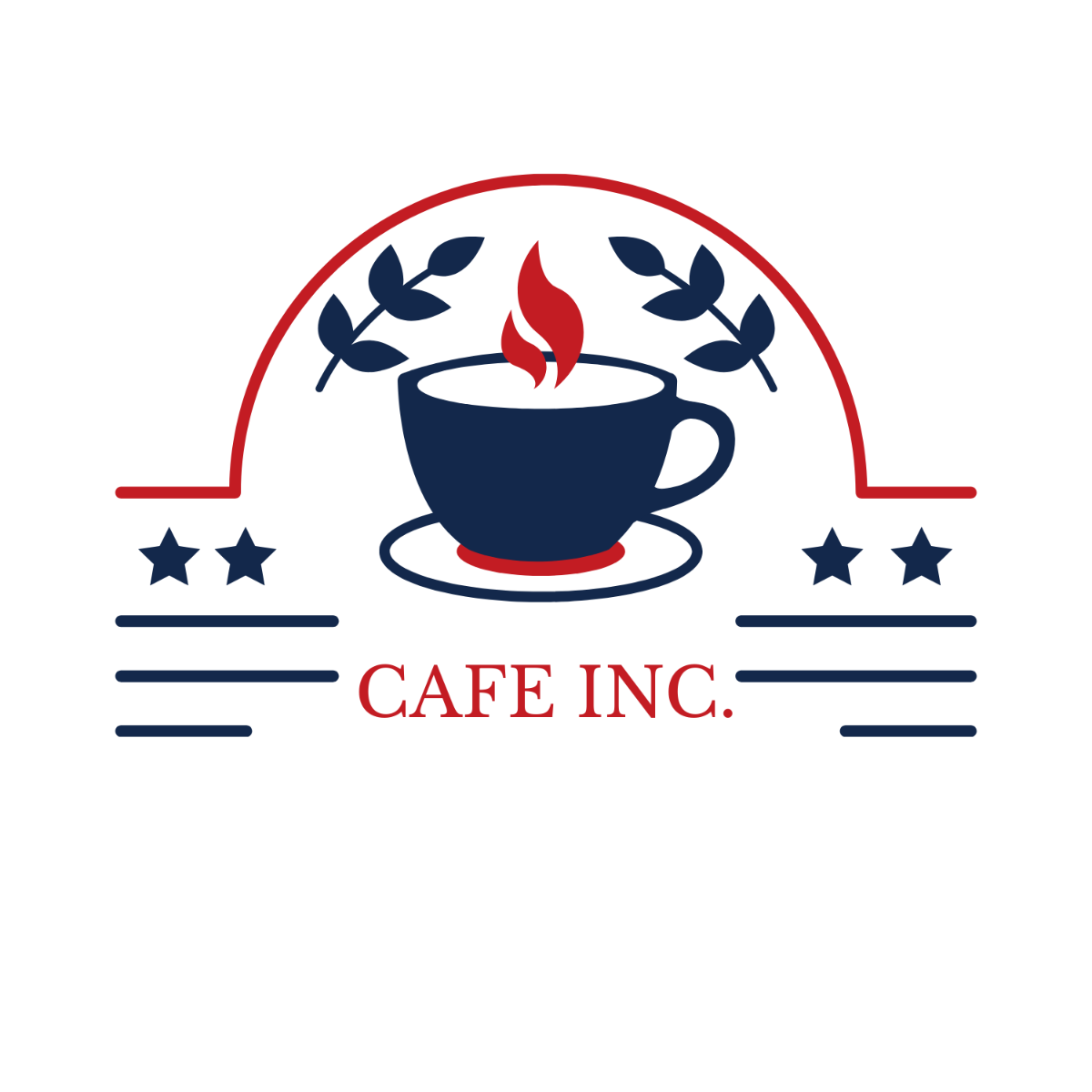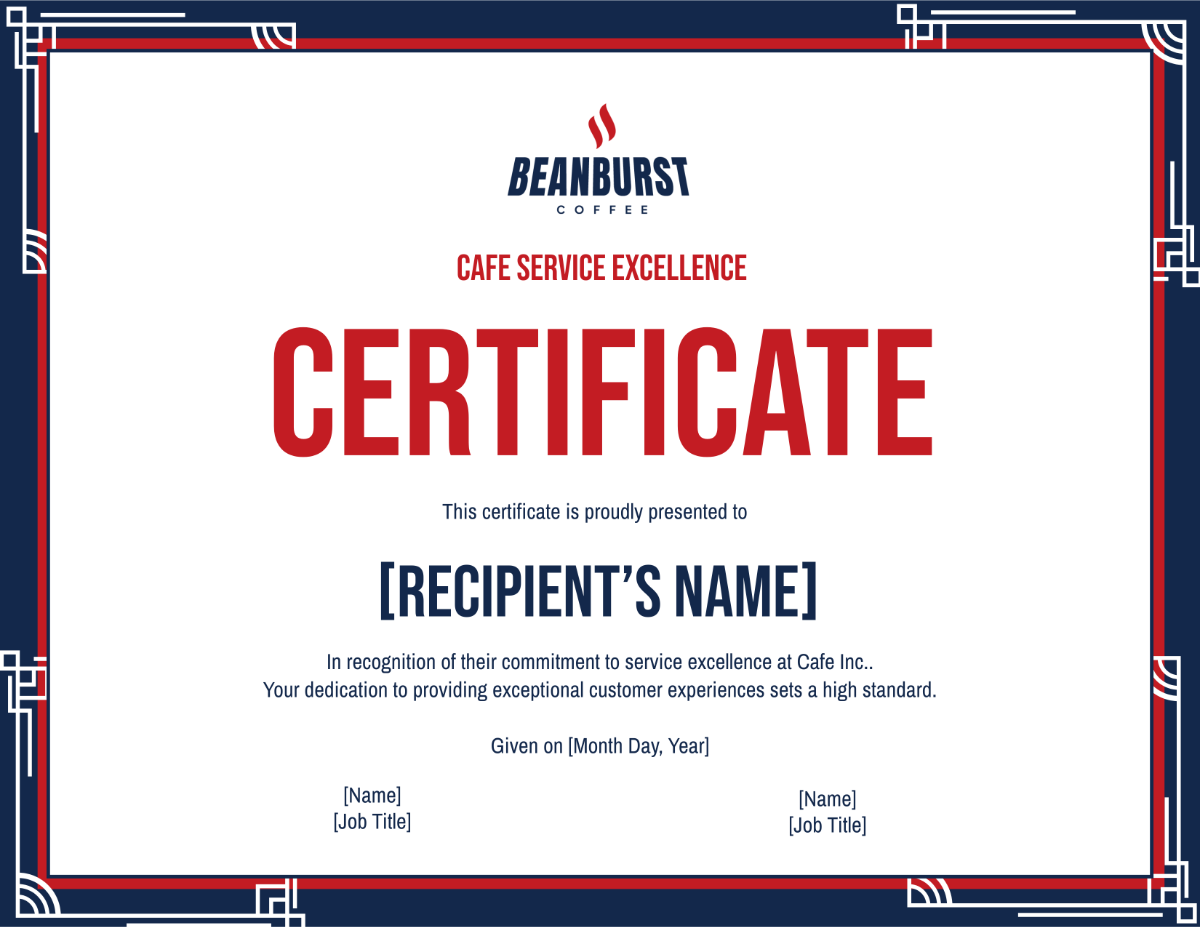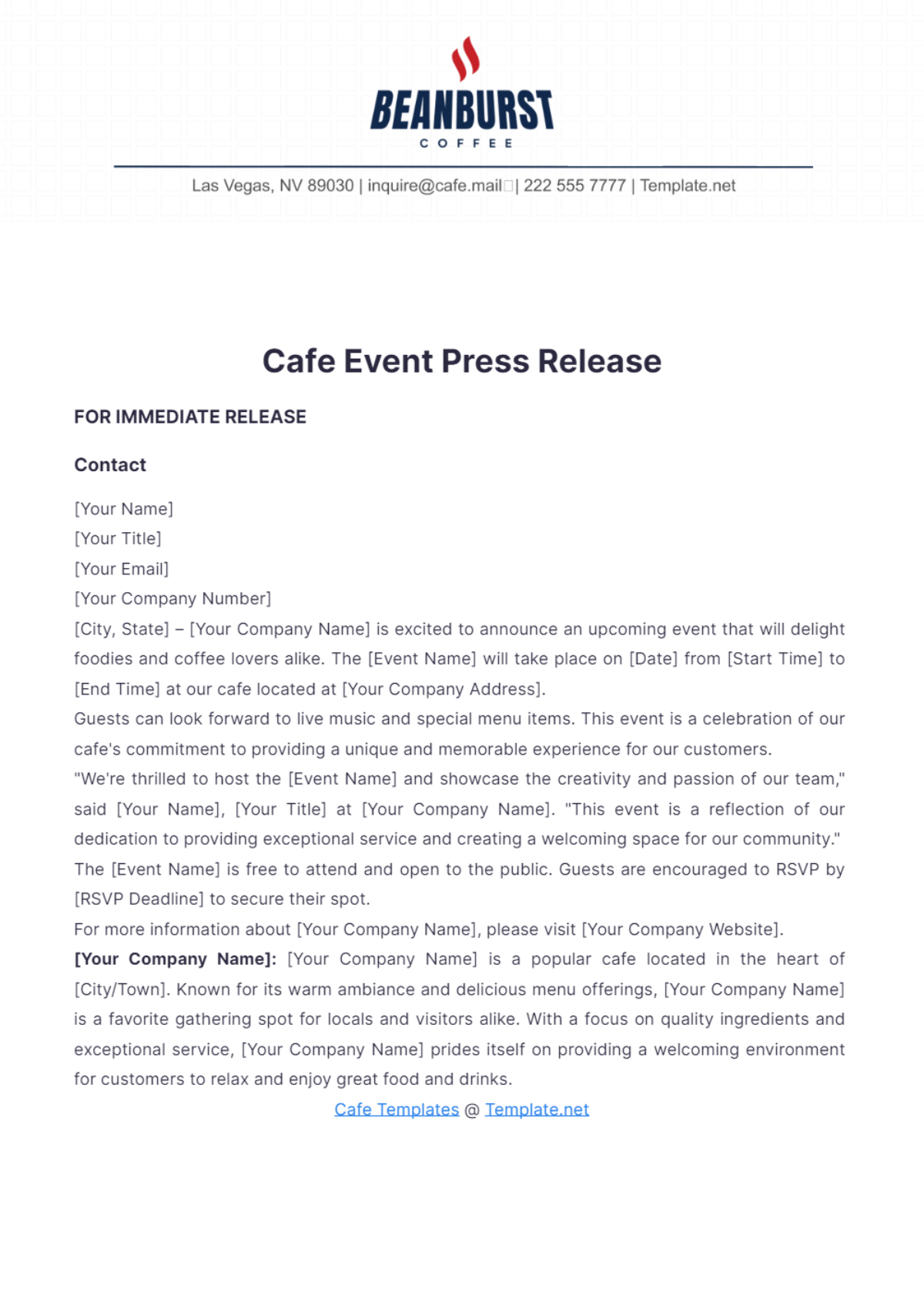Cafe Customer Service Guide
I. Introduction
A. Purpose of the Guide
The Cafe Customer Service Guide has been created to establish clear standards and expectations for delivering exceptional customer service. By adhering to the guidelines outlined in this document, we aim to ensure consistency in customer interactions and uphold the reputation of our cafe as a welcoming and enjoyable destination for all patrons.
B. Overview of Customer Service Philosophy
At [Your Company Name], we believe that outstanding customer service is the cornerstone of our success. We are committed to providing every customer with a positive and memorable experience, characterized by friendly greetings, efficient service, and genuine hospitality.
C. Importance of Consistency
Consistency is key to delivering exceptional customer service. By consistently meeting or exceeding our customers' expectations, we foster loyalty and build trust in our brand. Therefore, it is essential that all staff members familiarize themselves with the guidelines outlined in this document and strive to uphold them in every interaction.
II. Greeting and Welcoming Customers
A. Warm Welcome Protocol
As customers step foot into the cafe, it is imperative that they are met with a genuine and inviting smile, accompanied by a cordial and warm welcome. Every employee should ensure that they make direct eye contact and quickly recognize the presence of each customer, thus making sure that the customers feel an immediate sense of value and appreciation. This attentive and thoughtful approach helps create a positive and welcoming atmosphere from the moment they arrive.
B. Creating a Friendly Atmosphere
Creating a welcoming atmosphere in the café is of utmost importance, and this can be achieved by maintaining a consistently positive attitude and engaging with customers in a courteous and friendly manner. Staff members have a crucial role to play in this, as they should be approachable, displaying warmth and openness, so that customers feel inclined to interact with them without hesitation. Additionally, staff should be highly attentive to the needs and preferences of each customer, ensuring that everyone who walks through the door feels comfortable, valued, and at ease. By combining these efforts, the café can foster an inviting and pleasant environment where patrons are happy to spend their time.
C. Handling Busy Periods
During periods of high activity, which can include times such as peak hours or weekends, it becomes especially important to maintain a sense of calmness and composure while efficiently overseeing the movement and service of a large number of customers. In these situations, staff members should place a high priority on immediately greeting each customer as they arrive and ensuring that the wait times are managed as effectively as possible. At the same time, it is essential that they continue to provide attentive and high-quality service to every customer, regardless of the increased volume of demand.
III. Ordering Process
A. Taking Orders Efficiently
When undertaking the task of taking orders, it is essential for staff members to listen with full attention to the customers' requests and carefully input these details with precision into the point-of-sale (POS) system. Furthermore, it is of utmost importance for the staff to repeat the orders back to the customers in order to confirm their accuracy and to prevent any possible mistakes from occurring.
B. Accuracy and Attention to Detail
Attention to detail plays a vital role in guaranteeing order precision and overall customer satisfaction. It is imperative for staff members to meticulously review each order, whether they are sending it to the kitchen or preparing it themselves, to ensure that all details are correct. This thorough process helps to significantly reduce the occurrence of errors and prevents unnecessary delays, thereby contributing to a smoother and more pleasant dining experience for the customers.
C. Handling Special Requests and Dietary Requirements
It is imperative that all staff members possess a comprehensive understanding of the cafe's menu offerings. They should be well-versed in every item, including ingredients, preparation methods, and potential allergens. Additionally, they must have the capability to accommodate any special requests or dietary requirements that customers may have. This includes, but is not limited to, vegetarian, vegan, gluten-free, and other allergy-specific accommodations. Furthermore, it is crucial to convey any special requests clearly and accurately to the kitchen staff. Communication should be thorough to prevent any misunderstandings that could affect the customer's experience. By ensuring that all these requirements are met, we strive to provide exceptional service and cater to our customers’ needs to the fullest extent possible. This commitment to detailed knowledge and effective communication ensures that customer satisfaction is consistently achieved to the best of our ability.
IV. Product Knowledge
A. Menu Familiarization
It is imperative that staff members possess a comprehensive understanding of the cafe's entire menu, which encompasses a diverse array of beverages, a variety of food items, as well as any special offerings that may be introduced on a seasonal basis. To achieve this level of proficiency, the cafe will organize regular training sessions focused on the menu. These sessions are designed to equip staff with the necessary knowledge and confidence to effectively describe and recommend menu items to customers with competence and assurance.
B. Ingredients and Brewing Methods
The understanding of ingredients used in each menu item and the various brewing methods for coffee and tea is crucial for every staff member. This fundamental knowledge plays a vital role in several aspects of their job performance. Firstly, it enables them to provide accurate and detailed answers to customer inquiries regarding the components of menu items. Additionally, staff members equipped with this information can make informed and personalized recommendations, catering to individual customer preferences based on a thorough understanding of the menu's offerings. This level of expertise not only enhances the overall customer experience but also ensures that the staff can engage confidently and professionally with guests.
C. Specials and Promotions Awareness
Staff members should be informed about any specials or promotions currently being offered by the cafe. This includes limited-time menu items, discounts, or loyalty programs. Regular updates will be provided to ensure that staff can effectively communicate these offers to customers.
V. Service Speed
A. Efficient Order Preparation
Staff members should work efficiently to prepare orders in a timely manner, minimizing wait times for customers. This includes coordinating with the kitchen staff to ensure that food items are prepared promptly and coordinating multiple orders simultaneously.
B. Timely Delivery to Customers
After the orders have been diligently prepared, it is essential for the staff members to take on the responsibility of delivering these orders to the customers in a prompt and courteous manner. To ensure optimal customer satisfaction, it is crucial to give priority to the orders based on their readiness, thereby making certain that every customer receives their order while it remains hot and fresh. Staff members must be vigilant throughout this process, as the timely and polite delivery of orders plays a significant role in enhancing the overall customer experience.
C. Balancing Speed with Quality
While speed is important, it should not come at the expense of quality. Staff members should strive to maintain high standards of food and beverage preparation, ensuring that every order meets our quality criteria before being served to customers.
VI. Communication Skills
A. Active Listening Techniques
Staff members have a responsibility to engage in active listening during all interactions with customers. This means they should take care to genuinely understand and respond to the customers' needs and preferences. To do this effectively, staff members should make consistent eye contact, which helps convey attention and interest. Additionally, they should nod in acknowledgment to signal that they are following along with what the customer is saying. It is also important for staff to ask clarifying questions whenever something is not entirely clear, thereby ensuring a more accurate and empathetic understanding of the customer's concerns or desires. These practices collectively contribute to a more positive and effective communication experience.
B. Effective Verbal and Nonverbal Communication
Clear and effective communication is essential in delivering exceptional customer service. Staff members should communicate with customers in a friendly and professional manner, using clear and concise language. Nonverbal cues, such as body language and facial expressions, should also convey warmth and hospitality.
C. Handling Customer Inquiries and Concerns
When addressing customer inquiries or concerns, staff members should remain calm and attentive, listening carefully to the customer's perspective. They should offer solutions or alternatives when possible and escalate issues to management if necessary. The goal is to resolve customer concerns quickly and satisfactorily, ensuring a positive outcome for all parties involved.
VII. Upselling and Cross-Selling
A. Suggestive Selling Strategies
Staff members are encouraged to use suggestive selling techniques to enhance the customer experience and increase sales. This may include recommending popular menu items, suggesting add-ons or upgrades, or highlighting special promotions.
B. Recommending Complementary Items
When taking orders from customers, staff members should actively engage in the process of suggesting additional items that would complement and enhance the customer's initial selection. For instance, if a customer orders a coffee, the staff member could suggest a delectable pastry that pairs well with the beverage, thereby enriching the overall experience. Additionally, if a customer orders a main meal, the staff member should consider recommending a suitable side dish that would logically and tastefully complement the main course, thus providing the customer with a well-rounded and satisfying dining experience.
C. Enhancing Customer Experience
By offering personalized recommendations and attentive service, staff members can enhance the overall customer experience and encourage repeat business. Encouraging customers to try new menu items or offering samples can also help to expand their culinary horizons and foster loyalty to the cafe.
VIII. Cleanliness and Hygiene
A. Maintaining Clean and Tidy Workspaces
Each and every staff member has the responsibility to ensure that their workspaces are kept clean and orderly at all times. This includes the thorough maintenance of countertops, the proper upkeep of all equipment, and the cleanliness of the serving areas. To guarantee that cleanliness standards are maintained consistently throughout the cafe, we will implement regular cleaning schedules. These schedules are designed to provide a systematic approach to cleaning tasks, ensuring that all areas are attended to with care and diligence.
B. Personal Hygiene Standards for Staff
Staff members are expected to adhere to high standards of personal hygiene, including wearing clean uniforms, washing hands frequently, and maintaining a neat appearance. This helps to ensure the safety and well-being of both staff and customers.
C. Cleaning and Sanitation Protocols
In addition to regular cleaning tasks, staff members should be familiar with specific cleaning and sanitation protocols for different areas of the cafe. This includes proper cleaning procedures for food preparation areas, equipment, and restroom facilities.
IX. Payment and Transactions
A. Cash Handling Procedures
It is imperative that every staff member processes cash transactions with both precision and security, meticulously adhering to the established procedures designed for handling cash. This includes responsibly making change for customers, ensuring that the correct amounts are exchanged, and dutifully recording each transaction. Furthermore, at the conclusion of each work shift, staff members are required to thoroughly reconcile their cash registers, diligently accounting for all cash inflows and outflows to ensure accuracy and prevent any discrepancies.
B. Credit/Debit Card Processing
When processing credit or debit card payments, staff members should ensure that card information is handled securely and transactions are processed accurately. This includes verifying card signatures and checking identification when necessary.
C. Loyalty Programs and Discounts
Staff members should be familiar with the cafe's loyalty programs and discount offerings, including any eligibility criteria or redemption procedures. They should be able to assist customers with enrolling in loyalty programs or redeeming rewards points when making purchases.
X. Customer Feedback
A. Encouraging Feedback from Customers
We place a high importance on receiving feedback from our customers because it plays a crucial role in enhancing the quality of our services and ensures that we can more effectively address their needs and preferences. It is essential for our staff members to take a proactive approach in encouraging customers to share their thoughts, comments, and suggestions. This can be accomplished through various means such as prompting customers to fill out comment cards, requesting them to leave online reviews, or engaging in direct communication to gather their input. By fostering an environment where feedback is actively sought and valued, we are better equipped to make continuous improvements and provide exceptional service to our customers.
B. Feedback Collection Methods
Various methods will be used to collect customer feedback, including suggestion boxes, online surveys, and in-person feedback forms. Staff members should inform customers of these feedback channels and encourage them to share their thoughts and suggestions.
C. Addressing Feedback Constructively
All feedback, whether positive or negative, will be treated with respect and addressed promptly. Staff members should listen attentively to customer feedback, acknowledge any concerns or complaints, and take appropriate action to resolve issues and prevent recurrence.
XI. Conflict Resolution
A. Remaining Calm and Professional
When faced with a customer complaint or conflict, staff members should remain calm and composed, refraining from escalating the situation. They should adopt a professional demeanor and actively listen to the customer's concerns without interrupting or becoming defensive.
B. Resolving Customer Complaints
Staff members are encouraged to make every effort to address and resolve customer complaints in a timely and satisfactory manner. This includes swiftly identifying the issue at hand and taking appropriate action to apologize, propose solutions, or provide compensation when such measures are deemed necessary and fitting for the situation. In their endeavors to address the concerns raised by customers, staff should place significant emphasis on seeking out resolutions that are acceptable to both parties involved. By doing so, they should ensure that the customer walks away from the experience feeling both valued and respected.
C. Finding Mutually Satisfactory Solutions
In cases where a resolution cannot be reached immediately, staff members should escalate the issue to a manager or supervisor for further assistance. The goal is to find a mutually satisfactory solution that preserves the customer relationship and upholds the cafe's reputation for excellent customer service.
